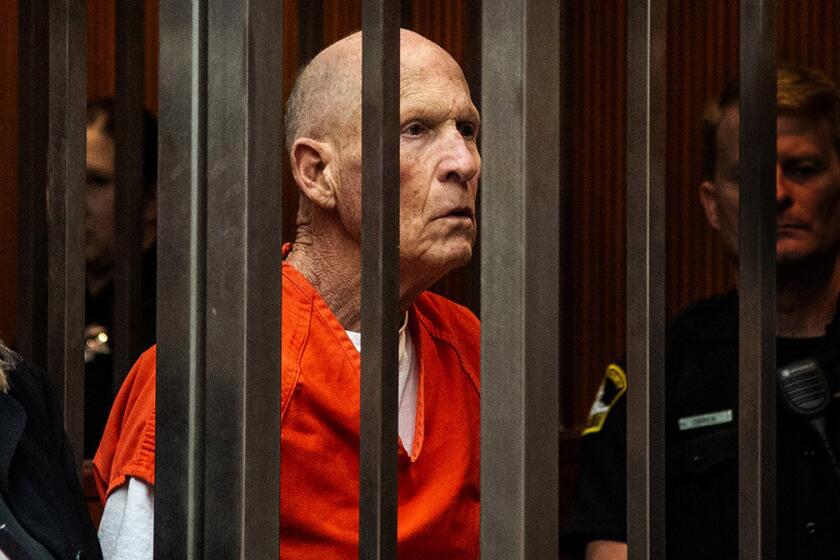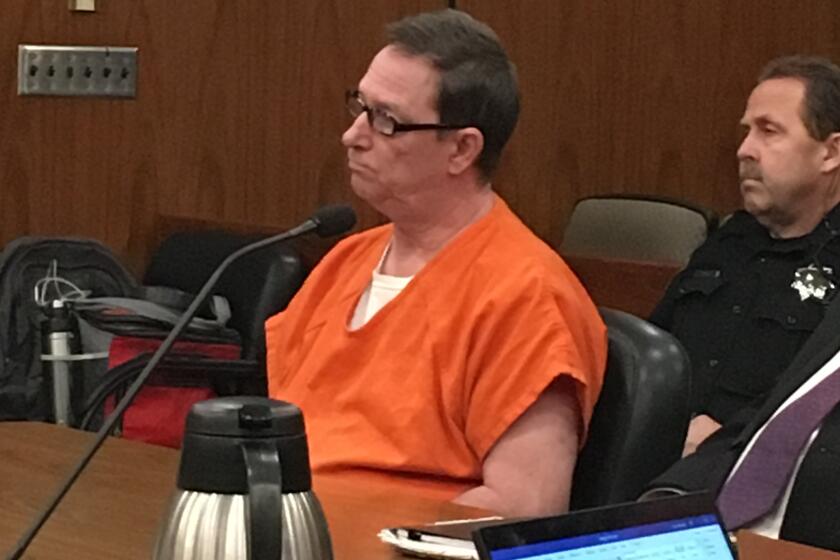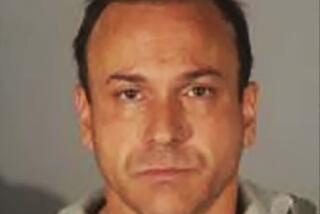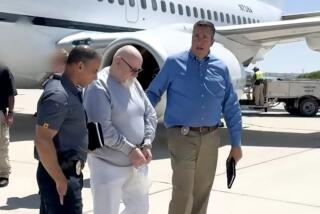Golden State Killer suspect agrees to guilty plea in a deal that spares him death penalty

Joseph James DeAngelo Jr., 74, has agreed to admit scores of crimes for which he is not charged, source said.
- Share via
The former police officer accused of terrorizing California during a series of rapes and killings nearly a half-century ago attributed to the Golden State Killer is expected to plead guilty this month in a deal that will spare him the death penalty, according to multiple sources.
Joseph James DeAngelo Jr., 74, is set to enter a guilty plea to 13 murders and kidnapping charges from as many rapes in a yet-to-be determined Sacramento County courtroom on June 29. The crimes occurred during the 1970s and ‘80s.
Many sources who were notified about the legal arrangement spoke on condition of anonymity because they were asked to not disclose the deal to the media. Nor are any legal motions outlining the plea deal required to be filed in court before June 29.
Sources said DeAngelo has also agreed to admit to scores of crimes for which he is not charged, including rapes, for which the statute of limitations has expired.
The agreement is a significant development in a criminal saga that could have lasted years longer if it had gone to trial but will now lack a public accounting of the evidence collected — and the missteps committed — by detectives over the course of the investigation.
“It’s a step forward ... but it’s not what I was hoping for,” said Kris Pedretti, one of the earliest victims, who was 15 when she was raped in 1976.
There are no criminal charges in connection with her attack, but Pedretti said she understands that DeAngelo is prepared to admit to her rape.
“I already know he raped me, that he was guilty,” she said, “but my deeper feeling is, ‘Why?’ What is so important that he does not want shown in trial that he is willing to do this? ... What is it that he doesn’t want to be known?”
Prosecutors had previously rebuffed DeAngelo’s offer to plead guilty in exchange for life in prison. The COVID-19 pandemic played a role in persuading prosecutors to now agree, according to two of the sources.
Most witnesses and victims in the case are elderly, and some of them are grappling with health problems. The logistics of how to arrange for their testimony, and provide defense lawyers with the ability to cross-examine those witnesses without exposing them to the coronavirus, were problematic, said one of the sources familiar with the decision.
District attorneys from the six counties prosecuting DeAngelo issued a statement Monday saying they have “a moral and ethical responsibility to consider any offer from the defense, given the massive scope of the case, the advanced age of many of the victims and witnesses, and our inherent obligations to the victims.”
The statement did not address whether a settlement agreement had been reached and said prosecutors would have no additional comment until the June 29 court hearing.
Victims of some of the crimes in the case voiced both relief and pain at the outcome.
“It’s pragmatic. This makes sense. It is efficient. It is cost-effective. It is ultimately where we were going to end,” said Jennifer Carole, whose father, Lyman Smith, was among those killed.
But Carole has been in tears since learning there will be no chance to see DeAngelo face evidence against him in court. “So what is justice for that? I’m sitting with that [question] every damn day,” she said.
Others said they saw no realistic away around a compromise.
Ron Harrington, whose youngest brother, Keith, was bludgeoned to death alongside his wife, Patrice, in Dana Point in 1980, said the “Golden State Killer should be and will always be the poster child for the death penalty.”
Still, he said he understood why prosecutors had agreed to a deal that would spare DeAngelo the possibility of execution but keep him in prison for the rest of his life.
“Both my brother and I are very, very supportive of life without parole,” he said.
Harrington and his family have spent decades advocating for the death penalty and expansion of databases containing the DNA of criminals. With that came continued pain, he said.
The plea deal, Harrington said, “will give us as much closure as we can achieve.”
Victor Hayes expressed frustration bordering on anger.
“I’m grateful he’s been caught, but the fact of the matter is he’s already lived a full life,” said Hayes, who was 21 when he and his 17-year-old girlfriend were attacked while in bed one night in September 1977 in a suburb east of Sacramento.
A masked intruder bound and threatened to kill Hayes, then pulled his girlfriend into another room and raped her multiple times before fleeing.
At the time, DeAngelo was working full time as a police officer for the Northern California foothill town of Auburn, about half an hour away.
Auburn fired DeAngelo in 1979 after he was caught shoplifting a hammer and dog repellent from a hardware store. Months later, the Golden State Killer began a series of killings in Southern California.
To an early love interest, Joe DeAngelo was energetic and worldly. Now, nearly 50 years later, he stands accused of an extended spasm of violence — home invasions, rapes, murders — in the 1970s and ’80s.
Hayes said authorities need to explain how DeAngelo was able to elude detection for so long.
“I’m very frustrated.... Somebody needs to be held accountable,” Hayes said.
DeAngelo is accused of crimes that extend from 1973 through 1986 across more than a dozen California counties, starting with early bedroom ransackings and a killing in Visalia. The attacks included a series of rapes and two more killings in the Sacramento and Bay Area regions, and then culminated in 10 more home invasion killings in Southern California.
Many of those targeted were couples. An investigation by The Times documented more than 106 victims who were bound, tortured, raped or killed.
For a decade after the last killing in 1986, police failed to link the crimes to a common attacker. The evolution of forensic DNA changed the case dramatically in 1996, when detectives first connected what had become known as the Original Night Stalker killings, and then in 2001, when DNA again provided links to Central California’s East Area Rapist.
But detectives made no more progress until early 2017, when law enforcement realized they could use DNA recovered from old rape kits and search for relatives of the unknown killer on family tree genetic databases. In early 2018, a Northern California team including agents from the FBI and detectives from Sacramento and Contra Costa counties used the controversial familial search method to trace a genetic path to DeAngelo.
The genetic detective work behind DeAngelo’s arrest created a novel approach to cold cases. Within a year, prosecutors across the United States announced rape and murder charges against scores of other individuals after detectives used the same technique.
Police and prosecutors are determined to access DNA information from private, consumer sites. They say the data is invaluable, but privacy advocates say the practice is ripe for abuses.
But in most of those cases, the accused either agreed to plead guilty or was dead, so the methodology had not been tested in a high-stakes court case. Prosecutors, including Sacramento County’s district attorney, have been developing guidelines for detectives on using public DNA databases while privacy advocates have raised concerns about police access to sensitive genetic information for the public at large.
Full details of the Golden State Killer investigation, and the police legwork that ensued after DeAngelo’s April 24, 2018, arrest, have never been disclosed. DeAngelo had never been a suspect in the long-running cold case.
The massive criminal case has been problematic for both prosecution and defense teams.
The Sacramento County district attorney’s office had told the court that a preliminary hearing to demonstrate there is enough evidence to bind the case over for trial could take months and involve more than 100 witnesses. The hearing was set to begin in August, but under the plea deal currently pending, DeAngelo would be sentenced on that date instead.
More to Read
Sign up for Essential California
The most important California stories and recommendations in your inbox every morning.
You may occasionally receive promotional content from the Los Angeles Times.













